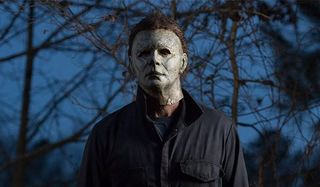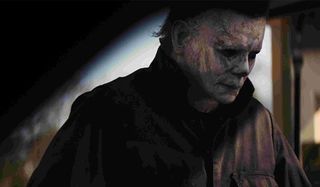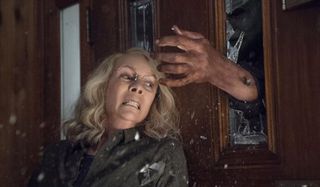Important Lessons Hollywood Can Learn From 2018's Halloween

While Halloween has always been one of the biggest brands in horror, no previous release in the franchise has been as immediately successful as David Gordon Green's new movie. In just three days the sequel managed to make more money than any other previous chapter did in their respective theatrical runs, and the goal was accomplished in part because the film has been riding high on a wave of positive buzz for nearly a month.
There is no questioning the massive accomplishments of the new Halloween -- and that success deserves analysis and recognition. This is largely because there are particular moves that the film made in its development to which other studios should definitely pay close attention. They break down into five lessons in total, so let's dive in:
Remakes Are Dumb
Is that a broad generalization? Of course. History is filled with filmmakers taking clever new ideas and crafting fantastic re-dos. At the same time, however, when you consider what the new Halloween has brought to the table, the benefits of the long-awaited-sequel over the straight remake are entirely clear. Not only do the numbers agree, with David Gordon Green's movie projected to earn more than double the box office of director Rob Zombie's two reboot entries (combined) a decade ago, but there's also no debating the creative opportunities presented by one tactic over the other.
Not being a remake, the new Halloween doesn't specifically speak to the weakness of remakes -- but what it does show is just the immense possibility that comes part and parcel with a sequel approach. In this particular case it look a bit of extra tinkering with the franchise timeline (more on that in a second), but the willingness to tell a 40-years-later story is the real key to the film's success. Rather than just running over treaded territory to create a facsimile, the movie instead has the chance to perfectly reflect on what came before and utilize it imaginatively and engagingly.
There's no point in hitting the reset button when there is strong material to build on, and we are getting to a point in Hollywood where decision-makers are starting to figure that out.

Continuity Can Be Flexible -- But Be Careful
Franchise continuity is a tricky thing. On the one hand it can be immensely rewarding for fans, as it's a lot of fun to recognize narrative directions and details setup by elements from previous chapters. On the other hand, though, crafting a strong continuity leaves a serious vulnerability to bad choices that wind up sticking around. In its own way, 2018's Halloween gets around this, essentially picking and choosing what it wants represented from the series' past, and it should be recognized that it's a big key to what lets the film work.
Prior to the arrival of David Gordon Green and co-writer Danny McBride, the Halloween franchise mostly consisted of straight-up bad Michael Myers stories and one cool unrelated feature about creepy masks that turn kids' brains into bugs and snakes. Paying attention to all this sub-par material would have legitimately hampered major creative decisions, and so they took an important and ultimately successful gamble that made the film better. This isn't something that any series can do, but there are major brands that could use some retconning without going all the way back to square one/the remake approach.
CINEMABLEND NEWSLETTER
Your Daily Blend of Entertainment News

Original Architects Matter
Part of the reason why the Halloween franchise lost its way can be traced back to its relationship with its creator: John Carpenter. After writing the original Halloween II, and producing Halloween III: Season Of The Witch, Carpenter's association with the brand came to an end -- and to avoid being repetitive, things didn't go well from there. The new movie is a major exception, in that it had it had the creator involved at the earliest stages, and the influence of that move is something that a lot of other series should acknowledge.
John Carpenter wasn't an overly aggressive creative voice behind the making of the new Halloween, but he did have two key roles. The first was as an executive producer, consulting on ideas and offering advice; but perhaps more importantly he also composed the beautiful and terrifying soundtrack -- helping evoke the magnificent atmosphere of his original. Even on a larger scale it's an influence that can't necessarily be fully defined, as it adds a certain level of credibility that can't otherwise be provided.
It's true that not every filmmaker is going to be comfortable in the position that John Carpenter took in this scenario, but at the same time it seems in most cases it would be worth the exploration given the potential outcome.

Don't Underestimate The Weight That Can Be Delivered By Veteran Stars
Jamie Lee Curtis has played many memorable roles over the course of her career, but the part that has made her an icon is Laurie Strode. She was the young woman with the fortitude to escape and defeat Michael Myers as a teenager back on Halloween night in 1978, and 40 years later we now get to see how she faces him down as an adult. And it's quite special. More than your average horror movie, the new Halloween packs a punch with its depiction of Laurie, who has never been able to fully get over the night she almost murdered. It's a complex and powerful portrayal with immense credit belonging to Curtis, who delivers a phenomenal and deeply committed performance.
In coming back to the part of Laurie Strode (albeit for the fourth time), Jamie Lee Curtis used the approach of the new Halloween to pay extra special attention to the life of her character -- tracing back her experiences all the way to the beginning. The results are simply awesome, and much like the influence of John Carpenter, they can't be simply replaced. It's theoretically easy, and always adds something special to the end experience.
In short, why haven't we heard about Kurt Russell being involved with the new Big Trouble In Little China yet?

A Twist Of Meta Never Hurts
Part of the life of any fan (of anything) is having high standards. Given personal investment of time and energy, we perpetually want to be rewarded with content that we can appreciate on a personal level. This, of course, provides a seriously challenging atmosphere for any creative who wants to take on any beloved property -- but there is a secret that the new Halloween exploits brilliantly. The key is employing nods and hints that let fans know that they are being heard and respected, and speak to them directly.
More than just characters talking about the myth that Michael Myers and Laurie Strode are brother and sister, Halloween lovingly plays with your expectations -- especially when it reverses classic elements (like having Laurie randomly appear and disappear just like her attacker). Not only does the material read as being smart and on-the-ball, but the meta pokes are also just a great deal of fun for an audience to experience. Above all, fans just want to know that they are being heard, and this is a spectacular way to do just that.

Eric Eisenberg is the Assistant Managing Editor at CinemaBlend. After graduating Boston University and earning a bachelor’s degree in journalism, he took a part-time job as a staff writer for CinemaBlend, and after six months was offered the opportunity to move to Los Angeles and take on a newly created West Coast Editor position. Over a decade later, he's continuing to advance his interests and expertise. In addition to conducting filmmaker interviews and contributing to the news and feature content of the site, Eric also oversees the Movie Reviews section, writes the the weekend box office report (published Sundays), and is the site's resident Stephen King expert. He has two King-related columns.
Most Popular



